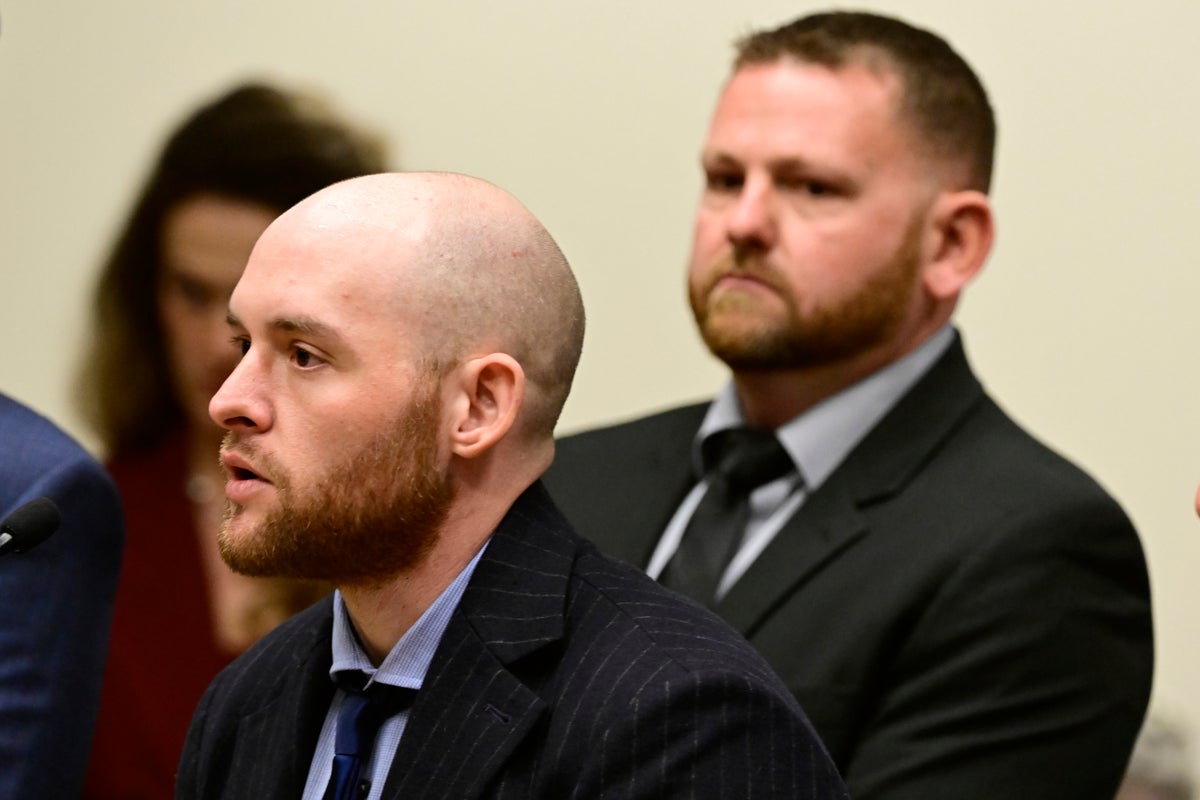
The trial of two Denver-area police officers charged in Elijah McClain’s death resumes Tuesday as prosecutors press their case that excessive force transformed the late-night stop of the Black man in the summer of 2019 into a fatal encounter.
Criminal charges were brought in 2021 after a national racial reckoning in the murder of George Floyd by Minneapolis police galvanized criticism over law enforcement abuses against Black people and revived interest in McClain's case.
The officers put McClain in a neck hold during the stop, and McClain can be heard on body camera footage saying he's having trouble breathing. Defense attorneys argue the officers were correctly performing their duties before paramedics gave McClain an overdose of a powerful sedative that led to complications causing his death.
Here's what you need to know about McClain's death and the trial in state court:
HOW DID ELIJAH McCLAIN DIE?
Police stopped McClain on the night of Aug. 24, 2019 while he was walking home from a convenience store and listening to music on earbuds in the city of Aurora. The 23-year-old massage therapist, who was often cold, was wearing a runner’s mask and jacket despite the warm weather. A 911 caller reported he seemed “sketchy.”
Three officers approached McClain and within 10 seconds, Officer Nathan Woodyard put his hands on McClain, turning him around. As McClain tried to escape his grip, Woodyard said, “Relax, or I’m going to have to change this situation.”
The encounter quickly escalated, with officers taking McClain to the ground and putting him in a neck hold, pressing against his carotid artery. Paramedics arrived and injected McClain with the sedative ketamine. He went into cardiac arrest on the way to the hospital and was taken off life support three days later.
WHY WERE THE OFFICERS CHARGED?
A Colorado prosecutor initially decided against prosecuting McClain’s death largely because the coroner’s office could not determine exactly how he died.
Following the protests over Floyd's death in 2020, Democratic Gov. Jared Polis directed Colorado’s attorney general to open a new investigation. Two paramedics and three officers were indicted by a state grand jury in 2021.
A revised coroner's report that relied in part on grand jury information said McClain died of complications from the ketamine after being forcibly restrained.
The officers now on trial — Randy Roedema and Jason Rosenblatt — are charged with manslaughter, criminally negligent reckless homicide and assault, all felonies. They pleaded not guilty.
Roedema, a former Marine who is currently suspended without pay, had been with the department for five years before McClain’s death. Rosenblatt worked for the agency for two years and was fired in 2020 for making light of other officers’ reenactment of the neck hold.
The two officers have not talked publicly about McClain’s death and it’s unknown if they’ll take the stand to testify. Their lawyers told jurors that the officers' actions followed police policies and weren’t responsible for McClain’s death. They’ve sought to shift any blame to the paramedics who injected the ketamine.
Body cameras worn by the officers captured the confrontation and that footage is being used by both sides to bolster their arguments.
DID THE KETAMINE ALONE KILL HIM?
That's what jurors will have to decide.
Rosenblatt initially tried to put McClain in a neck hold but couldn’t because of his position, so Woodyard did, authorities said. The maneuver, called a carotid control hold, restricts the flow of blood to a person’s brain, rendering them temporarily unconscious. Neck restraints have been banned in many states following the nationwide Black Lives Matter protests.
McClain had been kept on the ground for 15 minutes when paramedics gave him 500 milligrams of ketamine. He weighed 140 pounds (64 kilograms) but received a higher dose of ketamine than recommended for someone of his size and overdosed, pathologist Stephen Cina found.
“It’s really important that after Mr. McClain was handcuffed and on his side, he was breathing. He was talking with the officers,” said Roedema’s attorney, Reid Elkus. “When paramedics arrived on scene, the paramedics have full medical control. So what does that mean? That means they are in charge of the diagnosis of the suspect who’s now their patient. They’re also in charge of treating that suspect.”
But Cina also noted that the ketamine was injected after McClain was restrained.
McClain threw up repeatedly and inhaled vomit into his lungs that made it hard to breathe, according to Dr. David Beuther, a pulmonologist who testified for the prosecution. Even before the ketamine was injected, McClain's health had deteriorated to the extent that he belonged in a hospital intensive care unit, Beuther said.
WHAT ROLE DID EXCITED DELIRIUM PLAY?
Excited delirium is a controversial condition involving erratic behavior that is associated with chronic drug abuse, mental illness or both. Some doctors question whether it's real. Paramedics Jeremy Cooper and Peter Cichuniec concluded about two minutes after arriving on the scene that McClain was suffering from excited delirium, according the indictment. They did not talk to McClain or check his vital signs, it said.
Colorado’s health department announced in 2021 that emergency workers should not use excited delirium as a reason to inject people with ketamine. A report done by a medical panel for the department found that excited delirium is open to interpretation and has been “associated with racial bias against African American men.”
WHAT ABOUT THE OTHER OFFICER AND PARAMEDICS?
Woodyard is set to go on trial next month and paramedics Cooper and Cichuniec are scheduled to be tried in November. They each face similar felony charges.
Cooper and Cichuniec asked that their trials be separated from those for the officers.
Woodyard left the immediate scene before the paramedics arrived while Rosenblatt and Roedema remained.
Judge Mark Warner ruled in January that there would be separate trials to avoid “spillover prejudice” and guarantee that the proceedings are fair.







